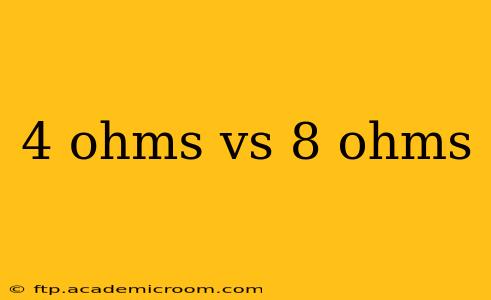Choosing the right speakers for your audio setup involves understanding several key specifications, and impedance (measured in ohms) is arguably one of the most crucial. This guide clarifies the difference between 4-ohm and 8-ohm speakers, helping you make an informed decision. We'll explore the impact on your amplifier, sound quality, and overall system performance.
What is Impedance?
Before diving into the 4-ohm vs. 8-ohm debate, let's define impedance. Impedance is the opposition a speaker presents to the flow of electrical current from your amplifier. It's measured in ohms (Ω), a unit of electrical resistance. Think of it like this: a higher impedance (like 8 ohms) offers more resistance, while a lower impedance (like 4 ohms) offers less resistance.
4 Ohms vs. 8 Ohms: Key Differences
The core difference lies in the amount of current drawn from the amplifier. A 4-ohm speaker demands more current than an 8-ohm speaker to produce the same volume. This has significant implications for your amplifier and overall system.
Power Handling:
- 4-ohm speakers: Generally handle more power, potentially leading to a louder output at the same voltage. However, this increased power draw also puts more strain on your amplifier.
- 8-ohm speakers: Demand less power, making them a safer bet for amplifiers with lower power ratings. They often produce a slightly less powerful sound at the same voltage.
Amplifier Compatibility:
This is a critical consideration. Many amplifiers specify a minimum impedance, often 8 ohms. Connecting a 4-ohm speaker to an amplifier not designed for it can lead to overheating, damage to the amplifier, or even failure. Always check your amplifier's specifications before connecting speakers. Using 8-ohm speakers is typically safer, as they are compatible with a wider range of amplifiers.
Sound Quality:
While impedance directly affects power handling, it doesn't inherently dictate sound quality. The quality of the speaker's construction, drivers, and overall design are far more influential. However, a properly matched impedance ensures your amplifier can deliver its optimal power to the speakers, contributing to a cleaner and more accurate sound reproduction. An impedance mismatch can lead to distortion or a reduction in sound quality.
What Happens if I Use the Wrong Impedance?
Connecting a 4-ohm speaker to an 8-ohm rated amplifier can result in several problems:
- Overheating: The amplifier will work harder to deliver the required power, leading to excessive heat generation.
- Distortion: The amplifier may struggle to maintain clean power output, resulting in distorted sound.
- Amplifier Damage: In severe cases, the amplifier might suffer permanent damage due to overheating or overload.
Connecting an 8-ohm speaker to a 4-ohm rated amplifier is generally safer, but you might not get the full potential power output from your amplifier.
Choosing the Right Impedance: Things to Consider
- Amplifier Specifications: Always prioritize your amplifier's minimum impedance rating.
- Speaker Sensitivity: A speaker's sensitivity (measured in dB) indicates how efficiently it converts electrical energy into sound. A more sensitive speaker might require less power to produce a comparable volume.
- Listening Preferences: Your personal listening habits and preferred volume levels will also influence your choice.
Frequently Asked Questions
Can I mix 4-ohm and 8-ohm speakers?
Mixing impedances isn't recommended unless your amplifier specifically supports it, and you understand the implications on the total impedance of the system. It can lead to uneven power distribution and potential issues with your amplifier. Generally, using speakers with matching impedance is the safest approach.
What is the best impedance for home theater?
8-ohm speakers are often preferred in home theater systems because they're more widely compatible with amplifiers and offer a safer option for long-term usage.
What if my amplifier doesn't list a minimum impedance?
If your amplifier's manual doesn't specify a minimum impedance, it's best to err on the side of caution and use 8-ohm speakers. Contacting the manufacturer is advisable to clarify compatibility.
Does a lower impedance always mean better sound?
No. Lower impedance doesn't inherently guarantee better sound quality. Sound quality is determined by many factors, including driver quality, cabinet design, and overall speaker construction. Impedance merely affects the power handling and compatibility with your amplifier.
Choosing between 4-ohm and 8-ohm speakers requires careful consideration of your amplifier's capabilities and your listening preferences. Prioritizing compatibility ensures a safe and optimal audio experience. Remember to always consult your amplifier's specifications before making a purchase.
